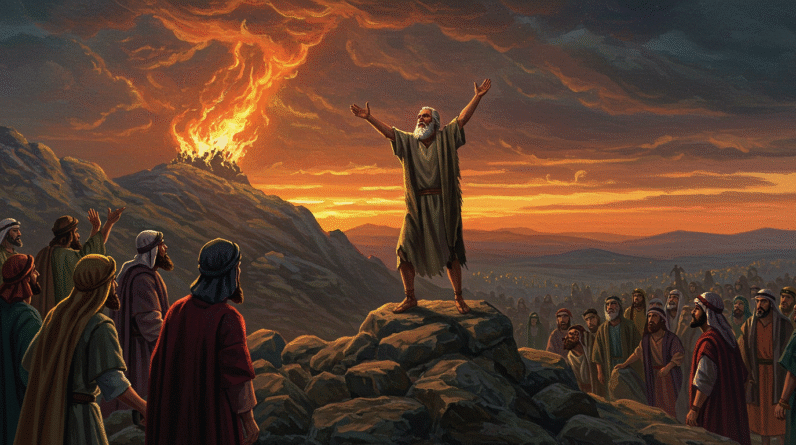Explore Jonah’s journey from reluctance to redemption. Delve into divine mercy and human frailty themes in this timeless biblical narrative.
Jonah: The Reluctant Prophet of Nineveh

Introduction
Meet Jonah, one of the most intriguing prophets in the Bible. Known for his reluctance to obey God’s command and his surprising journey, Jonah plays a significant role in biblical history. His story illustrates themes of redemption, repentance, and the boundless mercy of God. A key verse that brilliantly encapsulates his mission is found in Jonah 3:4, where Jonah proclaims, “Forty more days and Nineveh will be overthrown.”
Historical Background
Jonah lived around the 8th century BC, a period marked by political turbulence and societal unrest in the ancient Near East. He hailed from the northern kingdom of Israel during the reign of Jeroboam II, a time when the Assyrian Empire was a formidable force. Nineveh, the city central to Jonah’s narrative, was part of this empire and known for its formidable size and sinful reputation. The animosity between Israel and Assyria formed a backdrop that made Jonah’s mission to Nineveh particularly challenging and distasteful for him. During this period, prophets like Hosea and Amos also spoke against the moral and spiritual maladies afflicting the people.
God’s Call and Mission
Jonah’s journey began with a divine call. Unlike other prophets who expressed moments of doubt but eventually accepted their missions, Jonah’s story is unique in his outright refusal. God’s command came to Jonah explicitly: “Go to the great city of Nineveh and preach against it, because its wickedness has come up before me.” Jonah 1:1-2. Instead of heeding God’s call, Jonah fled in the opposite direction, boarding a ship to Tarshish. His reluctance stemmed from a deep-seated fear and hatred of Nineveh, compounded by his expectation of God’s mercy.
Key Events and Prophecies
Jonah’s narrative might be short, yet it is packed with powerful events. After attempting to escape to Tarshish, Jonah encounters a violent storm at sea, which leads him to be thrown overboard by the ship’s desperate crew—an act that calms the storm. Consumed by a great fish (often depicted as a whale), Jonah spends three days and nights in its belly. There, in the darkest moments, he prays to God, realizing his folly and promising to fulfill his duties if spared. The fish, in a miraculous act ordained by God, vomits Jonah onto dry land. The Lord gives Jonah a second chance to deliver His message to Nineveh. When Jonah finally obeys and preaches to the Ninevites, the entire city repents, turning from their wicked ways in response to his warning of imminent doom—a striking testament to God’s willingness to forgive. Jonah 3:3-10 captures this transformation beautifully.
Challenges and Opposition
Throughout his journey, Jonah faced considerable internal and external challenges. His initial opposition came not from outside sources, but from his own heart. His resistance to God’s directive highlights his struggle with obedience and compassion. Even after Nineveh repented, Jonah struggled with accepting God’s mercy towards them, instead choosing to sulk outside the city Jonah 4:1-3. His turmoil reveals a common human tendency to begrudge others the grace we gladly receive. God patiently taught Jonah a lesson on divine compassion through the object lesson of a gourd—a plant that sprung up to give Jonah shade, only to wither away the next day, signifying God’s sovereignty and the transient nature of Jonah’s concerns when compared to the fate of thousands.
Legacy and Impact
Jonah’s story continues to resonate throughout biblical texts and into contemporary thought, serving as a poignant reflection on God’s mercy and the human reluctance to accept it. In the New Testament, Jesus references Jonah as a sign of His death and resurrection, demonstrating the lasting spiritual significance of Jonah’s story Matthew 12:39-41. Jonah, through his reluctance and eventual obedience, has influenced countless generations, reminding believers of the importance of trust and humility before God. His story is a timeless testament to the power of repentance and the vast reach of divine mercy, encapsulating human struggles with faith, pride, and prejudice.
Lessons from Jonah
Despite his flaws, Jonah’s life offers profound spiritual lessons. His story emphasizes the futility of running from God’s calling and highlights the importance of obedience. From Jonah, we learn that God’s mercy extends to all, even those we deem undeserving. His attitude towards Nineveh reminds believers of the need for compassion and understanding. Today, Jonah’s message serves as a reminder that we are called to be messengers of God’s love, urging us to move beyond personal biases and extend grace universally.
Conclusion
Jonah stands as a remarkable example of human frailty juxtaposed with divine grace. His story transcends centuries, reminding us of our reluctance to follow God’s path. Through his journey, we learn that even in our resistance and failure, God’s purpose prevails. His narrative challenges us to reflect on our own lives, asking whether we are ready to embrace God’s call wholeheartedly. Are you prepared to enter the unknown, trusting in God’s plan and extending His grace to others?
Acknowledgment: All Bible verses referenced in this article were accessed via Bible Gateway (or Bible Hub)







